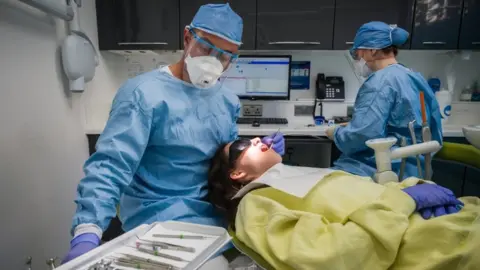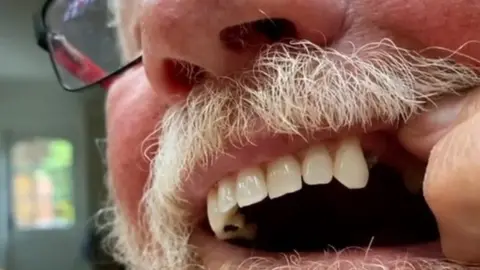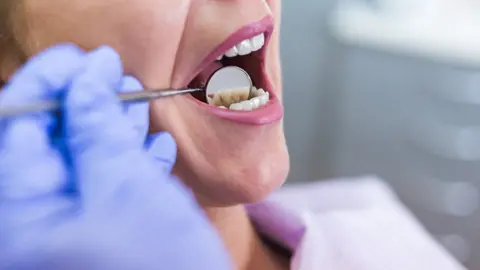Coronavirus Q&A: What dental services will reopen in NI on Monday?
 Getty Images
Getty ImagesHave you been nursing a toothache, in need of a filling, desperate for a root canal?
Many people in Northern Ireland have been waiting for weeks to see a dentist after most services were ended at the beginning of the Covid-19 lockdown.
Now that some dental surgeries are preparing to reopen from Monday 8 June, what services will be on offer and have safety concerns, which led to the closures, been addressed?
What has the situation been under lockdown?
The main reasons for the initial suspension of dental surgeries were the close proximity between dentist and patient during appointments and the concern about how the virus could spread with the use of aerosol-generating procedures (AGPs).
This means most routine fillings, root canals and scaling and polishing using instruments such as drills, sprays or syringes had to be stopped as droplets could be dispersed in the air.
To ensure that some emergency dental needs could be addressed, five regional urgent dental care centres (UDCs) were established in Northern Ireland, seeing about 250 patients a week.
These are located in Belfast, Ballymena, Craigavon, Lisburn and Omagh.
Richard Graham, Northern Ireland chair of the dental practice committee of the British Dental Association, said at the moment dentists have been advised to carry out telephone triage.
"If they feel the patient would benefit from a visit, say they need an extraction which is fairly straightforward, they can come into the practice and get that done, all other patients were being referred to the urgent dental care centres," he said.
"The problem with that is without actually seeing the patient it is difficult to make a definitive diagnosis."
What happens on Monday?
The Department of Health says from 8 June, urgent patients will be expected to be seen by dentists in their own practices.
The regional centres will continue to operate to cater for more complex referrals which require AGPs.

Mr Graham said most dental services require the use of AGPs, so staff will find this stage "extremely challenging" and "very frustrating", however, he believes it will improve the assessment of patients locally for referral to the regional centres.
He told BBC Radio Ulster's Good Morning Ulster programme on Wednesday that there has been "a lot of waste" working in the centres as staff "have to be prepared for everything" that could come in.
What about phases two and three?
There are no dates set yet for later stages of the reopening, however, the second phase states that dentists will be able to offer non-urgent dental care for prioritised patients in need.
AGPs will continue to be carried out at the five regional centres.
The plan for stage three is that AGPs will return to dental surgeries and pre-lockdown services will resume.
Have dentists' concerns been addressed?
Given the close proximity between dentist and patient during every form of face-to-face check-up or procedure, dentists have concerns about the availability of personal protective equipment (PPE).
Richard Graham said when services were shut down, many dentists donated their stock of PPE to care homes and community pharmacists.
Now that they are trying to source it back "PPE is a massive problem".
He said: "There has been between a 400 and 1,000% increase in the prices in some cases.
"It's been reported to me that they've been limited to the size of their orders.
"I've been told that delivery may take up to six weeks."
The British Dental Association, Mr Graham continued, has been involved in putting together further guidance on preparing for the resumption of dental services which he said will be issued "later this week".
 Getty Images
Getty ImagesWhat is the situation in the Republic of Ireland?
Seeking emergency dental treatment was one of the specified reasons for leaving home in the Republic of Ireland during the lockdown, meaning many surgeries remained open for urgent cases.
Telephone triage was used to assess patients, with requirements for staff to use personal protective equipment during appointments.
From 18 May, more routine appointments, although not back to pre-lockdown capacity, resumed with the first stage of the Irish government's wider roadmap to ease restrictions.

- LOOK-UP TOOL: How many cases in your area?
- GLOBAL SPREAD: Tracking the pandemic
- RECOVERY: How long does it take to get better?
- A SIMPLE GUIDE: What are the symptoms?

